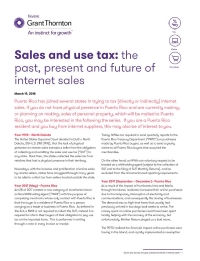-
Financial statements audits
Financial statement audits
-
Compliance audits
Compliance audits
-
Compilations and reviews
Compilations and audit
-
Agreed-upon procedures
Agreed-upon procedures
-
Corporate and business tax
Our trusted teams can prepare corporate tax files and ruling requests, support you with deferrals, accounting procedures and legitimate tax benefits.
-
International tax
Our teams have in-depth knowledge of the relationship between domestic and international tax laws.
-
Tax compliance
Business Tax
-
Individual taxes
Individual taxes
-
Estate and succession planning
Estate and succession planning
-
Global mobility services
Through our global organisation of member firms, we support both companies and individuals, providing insightful solutions to minimise the tax burden for both parties.
-
Sales and use tax and indirect taxes
SUT/ VAT & indirect taxes
-
Tax incentives program
Tax incentives program
-
Transfer Pricing Study
The laws surrounding transfer pricing are becoming ever more complex, as tax affairs of multinational companies are facing scrutiny from media, regulators and the public
-
Business consulting
Our business consulting services can help you improve your operational performance and productivity, adding value throughout your growth life cycle.
-
Forensic and investigative services
At Grant Thornton, we have a wealth of knowledge in forensic services and can support you with issues such as dispute resolution, fraud and insurance claims.
-
Fraud and investigations
The commercial landscape is changing fast. An ever more regulated environment means organizations today must adopt stringent governance and compliance processes. As business has become global, organizations need to adapt to deal with multi-jurisdictional investigations, litigation, and dispute resolution, address the threat of cyber-attack and at the same time protect the organization’s value.
-
Dispute resolutions
Our independent experts are experienced in advising on civil and criminal matters involving contract breaches, partnership disputes, auditor negligence, shareholder disputes and company valuations, disputes for corporates, the public sector and individuals. We act in all forms of dispute resolution, including litigation, arbitration, and mediation.
-
Business risk services
We can help you identify, understand and manage potential risks to safeguard your business and comply with regulatory requirements.
-
Internal audit
We work with our clients to assess their corporate level risk, identify areas of greatest risk and develop appropriate work plans and audit programs to mitigate these risks.
-
Service organization reports
As a service organization, you know how important it is to produce a report for your customers and their auditors that instills confidence and enhances their trust in your services. Grant Thornton Advisory professionals can help you determine which report(s) will satisfy your customers’ needs and provide relevant information to your customers and customers’ auditors that will be a business benefit to you.
-
Transaction advisory services
Transactions are significant events in the life of a business – a successful deal that can have a lasting impact on the future shape of the organizations involved. Because the stakes are high for both buyers and sellers, experience, determination and pragmatism are required to bring deals safely through to conclusion.
-
Mergers and acquisitions
Globalization and company growth ambitions are driving an increase in M&A activity worldwide as businesses look to establish a footprint in countries beyond their own. Even within their own regions, many businesses feel the pressure to acquire in order to establish a strategic presence in new markets, such as those being created by rapid technological innovation.
-
Valuations
We can support you throughout the transaction process – helping achieve the best possible outcome at the point of the transaction and in the longer term.
-
Recovery and reorganization
We provide a wide range of services to recovery and reorganisation professionals, companies and their stakeholders.
Puerto Rico has joined several states in trying to tax (directly or indirectly) internet sales. If you do not have physical presence in Puerto Rico and are currently making, or planning on making, sales of personal property, which will be mailed to Puerto Rico, you may be interested in the following the series. If you are a Puerto Rico resident and you buy from internet suppliers, this may also be of interest to you.
Year 1992 – North Dakota
The United States Supreme Court decided in Quill v. North Dakota, 504 U.S. 298 (1992), that the lack of physical presence on remote sales exempts a seller from the obligation of collecting and remitting the sales and use tax (“SUT”) to any state. Back then, the states collected the sales tax from retailers that had a physical presence in their territory.
Nowadays, with the increase and proliferation of online sales by remote sellers, states have struggled through many years to be able to collect tax from sellers located outside the state.
Year 2017 (May) – Puerto Rico
Act 25 of 2017 created a new category of merchants known as Non-Withholding Agent (“NWA”) with the purpose of comprising merchants whose only contact with Puerto Rico is that the buyer is a resident of Puerto Rico or a person carrying on a trade or business in Puerto Rico. As defined in the Act, a NWA is not required to collect the SUT, instead it is required to inform their buyers of their obligation to pay use tax on the imported items. This is performed in writing through a note in every invoice or receipt.
Today, NWAs are required to send quarterly reports to the Puerto Rico Treasury Department (“PRTD”) on purchases made by Puerto Rico buyers, as well as to send a yearly notice to all Puerto Rico buyers that acquired the merchandise.
On the other hand, an NWA can voluntary request to be treated as a withholding agent (subject to the collection of SUT and to the filing of SUT Monthly Returns), and be excluded from the aforementioned reporting requirements.
Year 2017 (September – December) – Puerto Rico
As a result of the impact of Hurricanes Irma and María through the Island, residents increased their online purchases due to the temporary interruption of electricity and communications, and consequently the closing of businesses. The demand was so high that items that usually had previously arrived in two days took weeks to arrive. The money spent on online purchases could have been spent locally helping with the recovery of the economy, but unfortunately, Mother Nature played us a bad move.
The PRTD realized the financial impact online purchases were having in the Island, and rapidly implemented an exemption period from November 20, 2017 through December 31, 2017 that allowed certain local merchants to be exempt from collecting the SUT in their sales. With this exemption, the PRTD tried to boost the local commerce.
Year 2018 – South Dakota
The United States Supreme Court granted certiorari in the case South Dakota v. Wayfair, 17-494 on whether remote sellers can be required to collect and remit SUT in a state even though such seller does not have physical presence.
The final decision could end the debate over how to apply sales taxes to online sales. Even more important, it could reverse the verdict in Quill v. North Dakota. The wait for many states is soon to be over as they are more than ready to start collecting sales tax on online sales.
Year 2018 – Puerto Rico
Earlier in 2018, the PRTD was able to “pull out an ace under its sleeve” by announcing that it had reached an agreement with one of the main internet sales companies to collect the SUT from its customers. The agreement contained confidentiality clauses that prevented the disclosure of the company’s name. Nevertheless, on March 16, they announced that Amazon had agreed to start collecting the SUT on its sales to Puerto Rico commencing on April 1, 2018.
Nevertheless, and not withstanding more internet sellers join Amazon in collecting SUT, merchants and non-merchants are required by law to file a Declaration of Imports and pay use tax on personal property imported into Puerto Rico. Usually, non-merchants believe that this requirement applies only to merchants and forget that the Internal Revenue Unified System (“SURI” for its Spanish acronym) provides the option for non-merchants to pay the corresponding use tax. The PRTD realizes that compliance on the part of the consumer is low and will require great effort to increase; therefore, they concentrate in getting these agreements and collaborations with online sellers.
While we await for the decision of the Supreme Court (hearings are scheduled for April) we foresee more of these collaboration agreements to follow, especially after the highly publicized economic impact of last year’s storms. Corporations that want to be “good corporate citizens” may join in the effort to provide government with resources to reconstruct the island.
Keep watching this space for more developments.


